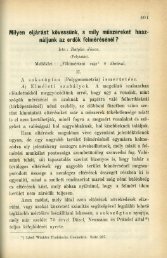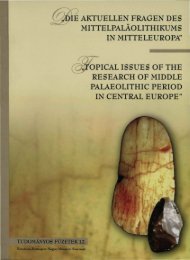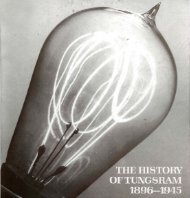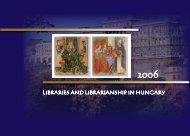national populism and slovak â hungarian relations in - MEK
national populism and slovak â hungarian relations in - MEK
national populism and slovak â hungarian relations in - MEK
You also want an ePaper? Increase the reach of your titles
YUMPU automatically turns print PDFs into web optimized ePapers that Google loves.
Magyars <strong>and</strong> Slovaks <strong>in</strong> Southern Slovakia...While discrim<strong>in</strong>ation based on age was more frequently perceived by Slovakrespondents <strong>and</strong> although both groups of respondents equally frequentlycompla<strong>in</strong>ed about discrim<strong>in</strong>ation based on socio-economic situation, sex <strong>and</strong>profession, ethnic Hungarians feel discrim<strong>in</strong>ated aga<strong>in</strong>st generally more frequently.From the viewpo<strong>in</strong>t of our pr<strong>in</strong>cipal topic, it is particularly importantthat the most frequent reason for discrim<strong>in</strong>at<strong>in</strong>g aga<strong>in</strong>st them is theirnative language <strong>and</strong> <strong>national</strong>ity. Almost two <strong>in</strong> five ethnic Hungarian respondents(39%) mentioned a negative experience due to speak<strong>in</strong>g Hungarian;more than one <strong>in</strong> three of them (35%) feel discrim<strong>in</strong>ated aga<strong>in</strong>st becausethey view themselves as Hungarian. 3 While some Slovaks have similarlynegative experience regard<strong>in</strong>g the use of mother tongue <strong>and</strong> <strong>national</strong>ity, theirshare is substantially lower compared to that of ethnic Hungarians. Ofcourse, discrim<strong>in</strong>ation has no m<strong>in</strong>imum ‘tolerance’ as every s<strong>in</strong>gle case isunjust <strong>and</strong> unjustifiable; however, statistical data aga<strong>in</strong> prove that oppressionof Slovaks by ethnic Hungarians <strong>in</strong> southern Slovakia is a myth.Notes1 The survey formed part of the project called Challeng<strong>in</strong>g National Populism <strong>and</strong> Promot<strong>in</strong>gInterethnic Tolerance <strong>and</strong> Underst<strong>and</strong><strong>in</strong>g <strong>in</strong> Slovakia.2 Dur<strong>in</strong>g <strong>in</strong>terviews <strong>in</strong> focus groups, several Slovak <strong>and</strong> ethnic Hungarian respondents mentionedthat ‘newcomers’ (i.e. everyone who married <strong>in</strong>to an ethnic Hungarian family)learned to speak Hungarian <strong>in</strong> the past; while respondents were unable to put a time frameon it, almost all of them had this k<strong>in</strong>d of experience. In the words of one female respondent:“This is someth<strong>in</strong>g completely new. Whether it was <strong>in</strong> Rožòava or at home, <strong>in</strong> thecountryside, if Gypsies or Slovaks became members of a family, they learned Hungarian<strong>and</strong> no one was forced to switch languages. Everybody spoke Hungarian. Nowadays it isk<strong>in</strong>d of strange as even children from Hungarian families refuse to speak Hungarian <strong>and</strong>they rem<strong>in</strong>d their parents <strong>and</strong> gr<strong>and</strong>parents to speak Slovak because they are ashamed ofspeak<strong>in</strong>g Hungarian.” Another female respondent expressed ambivalent feel<strong>in</strong>gs by say<strong>in</strong>g:“My daughter learned to speak Slovak. I am proud that she had an ‘A’ <strong>in</strong> Slovak language.But then she met a Slovak man <strong>and</strong> now she turned <strong>in</strong>to a Slovak woman. That bothers meso. I am happy that she is happy with him but I am afraid that she will not teach her childrento speak Hungarian. I feel … I don’t know, I guess I feel betrayed. The man is agreeablebut when he comes to our place, he just withdraws <strong>in</strong>to a corner <strong>and</strong> does not sayanyth<strong>in</strong>g. I tune on to Pátria [the Slovak Radio’s frequency for m<strong>in</strong>orities] <strong>and</strong> my daughtertells me right away: Mom, would you turn it off, please …”3 The focus group survey <strong>in</strong>dicates important changes <strong>in</strong> terms of discrim<strong>in</strong>ation occurrence<strong>in</strong> certa<strong>in</strong> areas, for <strong>in</strong>stance dur<strong>in</strong>g local football games. In the words of one male respondent:“I played football s<strong>in</strong>ce I was a kid. As a football player, I have visited all surround<strong>in</strong>gvillages. Ten or fifteen years ago, it was totally normal to treat us to refreshmentsboth before <strong>and</strong> after the game; [the hosts] served us pastry <strong>and</strong> everyth<strong>in</strong>g was jolly good.Nowadays, we hear more <strong>and</strong> more aggressive chants such as fuck<strong>in</strong>g Hungarians dur<strong>in</strong>ggames <strong>in</strong> the same villages. And residents of those Slovak villages gawk at us as if we atetheir bread.”National Populism <strong>and</strong> Slovak – Hungarian Relations <strong>in</strong> Slovakia 2006 – 2009. Forum M<strong>in</strong>ority Research Institute Šamorín – Somorja, 2009179


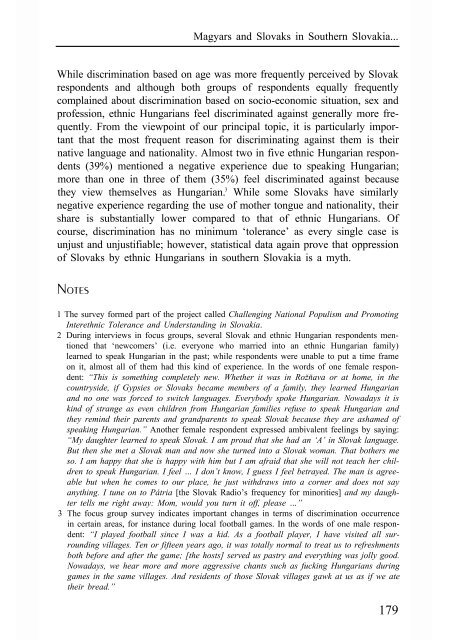
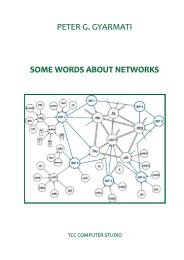

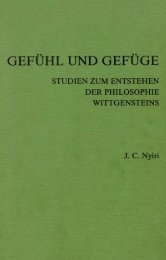
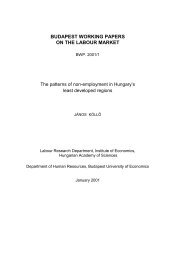

![Letöltés egy fájlban [4.3 MB - PDF]](https://img.yumpu.com/50159926/1/180x260/letaltacs-egy-fajlban-43-mb-pdf.jpg?quality=85)

